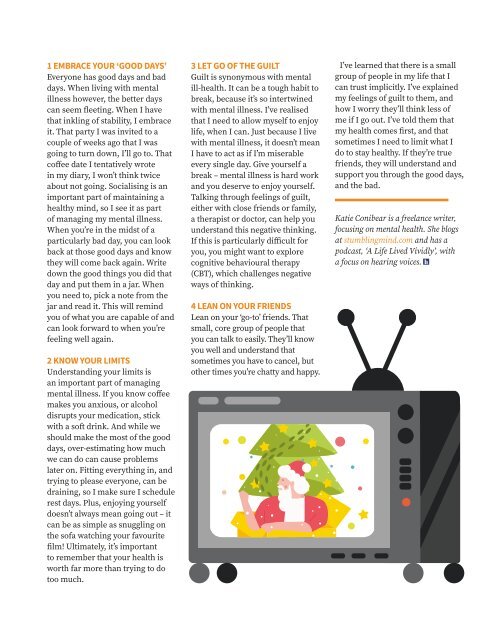Happiful December 2019
You also want an ePaper? Increase the reach of your titles
YUMPU automatically turns print PDFs into web optimized ePapers that Google loves.
1 EMBRACE YOUR ‘GOOD DAYS’<br />
Everyone has good days and bad<br />
days. When living with mental<br />
illness however, the better days<br />
can seem fleeting. When I have<br />
that inkling of stability, I embrace<br />
it. That party I was invited to a<br />
couple of weeks ago that I was<br />
going to turn down, I’ll go to. That<br />
coffee date I tentatively wrote<br />
in my diary, I won’t think twice<br />
about not going. Socialising is an<br />
important part of maintaining a<br />
healthy mind, so I see it as part<br />
of managing my mental illness.<br />
When you’re in the midst of a<br />
particularly bad day, you can look<br />
back at those good days and know<br />
they will come back again. Write<br />
down the good things you did that<br />
day and put them in a jar. When<br />
you need to, pick a note from the<br />
jar and read it. This will remind<br />
you of what you are capable of and<br />
can look forward to when you’re<br />
feeling well again.<br />
2 KNOW YOUR LIMITS<br />
Understanding your limits is<br />
an important part of managing<br />
mental illness. If you know coffee<br />
makes you anxious, or alcohol<br />
disrupts your medication, stick<br />
with a soft drink. And while we<br />
should make the most of the good<br />
days, over-estimating how much<br />
we can do can cause problems<br />
later on. Fitting everything in, and<br />
trying to please everyone, can be<br />
draining, so I make sure I schedule<br />
rest days. Plus, enjoying yourself<br />
doesn’t always mean going out – it<br />
can be as simple as snuggling on<br />
the sofa watching your favourite<br />
film! Ultimately, it’s important<br />
to remember that your health is<br />
worth far more than trying to do<br />
too much.<br />
3 LET GO OF THE GUILT<br />
Guilt is synonymous with mental<br />
ill-health. It can be a tough habit to<br />
break, because it’s so intertwined<br />
with mental illness. I’ve realised<br />
that I need to allow myself to enjoy<br />
life, when I can. Just because I live<br />
with mental illness, it doesn’t mean<br />
I have to act as if I’m miserable<br />
every single day. Give yourself a<br />
break – mental illness is hard work<br />
and you deserve to enjoy yourself.<br />
Talking through feelings of guilt,<br />
either with close friends or family,<br />
a therapist or doctor, can help you<br />
understand this negative thinking.<br />
If this is particularly difficult for<br />
you, you might want to explore<br />
cognitive behavioural therapy<br />
(CBT), which challenges negative<br />
ways of thinking.<br />
4 LEAN ON YOUR FRIENDS<br />
Lean on your ‘go-to’ friends. That<br />
small, core group of people that<br />
you can talk to easily. They’ll know<br />
you well and understand that<br />
sometimes you have to cancel, but<br />
other times you’re chatty and happy.<br />
I’ve learned that there is a small<br />
group of people in my life that I<br />
can trust implicitly. I’ve explained<br />
my feelings of guilt to them, and<br />
how I worry they’ll think less of<br />
me if I go out. I’ve told them that<br />
my health comes first, and that<br />
sometimes I need to limit what I<br />
do to stay healthy. If they’re true<br />
friends, they will understand and<br />
support you through the good days,<br />
and the bad.<br />
Katie Conibear is a freelance writer,<br />
focusing on mental health. She blogs<br />
at stumblingmind.com and has a<br />
podcast, ‘A Life Lived Vividly’, with<br />
a focus on hearing voices.

















